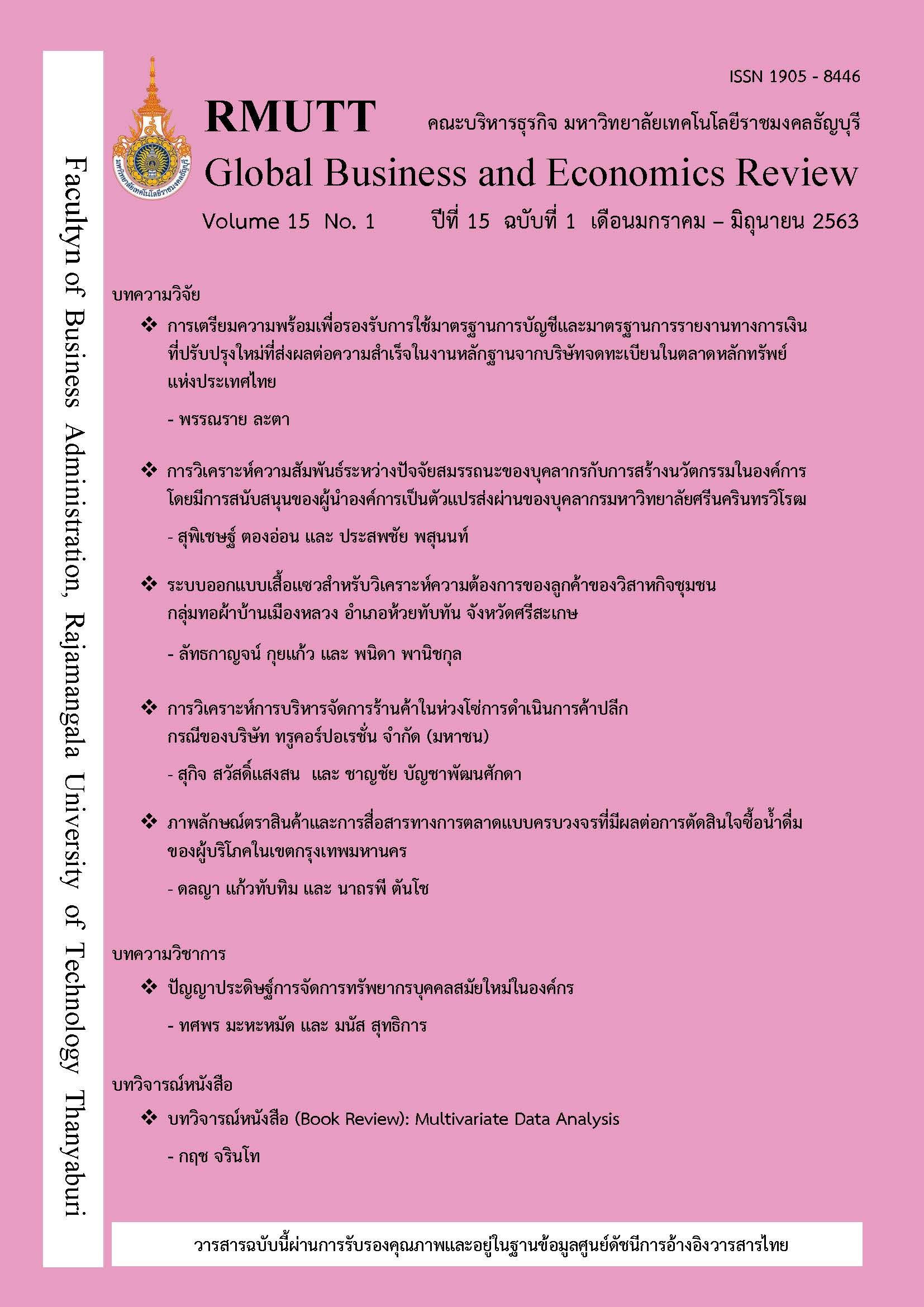The INFLUENCES OF ADOPTION PREPARATION OF THE UPDATE OF THAI ACCOUNTING STANDARDS (TAS) AND THAI FINANCIAL REPORTING STANDARDS (TFRS) ON JOB SUCCESS OF ACCOUNTING DEPARTMENT : AN EMPIRICAL INVESTIGATION OF THAI-LISTED FIRMS
Keywords:
Job Success of Accounting Department, Adoption Preparation, Basic Accounting Knowledge, Professional Skills, Willingness to Accept Change, Organizatinal Learning DynamismAbstract
The main purpose of this study was to examine the influences of adoption preparation of the update of Thai Accounting Standards (TAS) and Thai Financial Reporting Standards (TFRS) on job success of the accounting department both overall and dimensions. The adoption preparation consisted of 4 dimensions, including basic accounting knowledge, professional skills, willingness to accept change, and organizational learning dynamism. To build confidence among users of financial statements, regulatory agencies began to push continually, adjusting, and upgrading Thai Accounting Standards and Thai Financial Reporting Standards to global accounting convergence. Preparing and promoting accountants in the organization to continually improve their accounting professional knowledge and to keep track of changes in accounting standards is essential for the organization to apply the knowledge that has been applied to their work correctly. The data were collected from a survey of 142 Thai-listed firms. The key informants were the accounting managers. Multiple regression analysis was used to test hypotheses. The update of Thai Accounting Standards (TAS) involved Presentation of Financial Statements, Statement of Cash Flows, Income Taxes, Inventories, Accounting Policies, Changes in Accounting Estimates and Errors as the top 5 that organizations need to send accountants for the most training. The regression results found that adoption preparation of the update of Thai Accounting Standards (TAS) and Thai Financial Reporting Standards (TFRS) have a positive effect on job success of the accounting department. In each dimension, the results found professional skills, willingness to accept change, and organizational learning dynamism positively affect job success.
References
เอกสารอ้างอิง
กิติยาภรณ์ อินธิปีก. (2557). ปัจจัยที่มีผลต่อการเตรียมความพร้อมของผู้ประกอบวิชาชีพบัญชีในประเทศไทยเพื่อรองรับประชาคม เศรษฐกิจอาเซียน. (วิทยานิพนธ์ปริญญามหาบัณฑิต, มหาวิทยาลัยนานาชาติแสตมฟอร์ด).
กุลชญา แว่นแก้ว. (2558). การเตรียมความพร้อมเพื่อรองรับการประกาศใช้ชุดมาตรฐานการรายงานทางการเงินสำหรับธุรกิจขนาด กลางและขนาดย่อม (TFRS for SMEs) ในเขตอำเภอเมือง จังหวัดเชียงใหม่. เชียงใหม่: มหาวิทยาลัยแม่โจ้.
ตลาดหลักทรัพย์แห่งประเทศไทย. (2562). รายงานประจำปี 2561. กรุงเทพฯ: ตลาดฯ.
ปิยะฉัตร จารุธีรศานต์. (2558). วิธีการจัดการความรู้ในภาคอุตสาหกรรม กรณีศึกษานิคมอุตสาหกรรมทั่วประเทศไทย. RMUTT Global Business and Economics Review, 10(1), 61-72.
พิฐชญาณ์ คาเนโกะ. (2560). ระดับการเตรียมความพร้อมด้านสมรรถนะนักบัญชีไทย ความสามารถในการปรับตัวและความสำเร็จใน วิชาชีพบัญชีหลังเข้าสู่ประชาคมเศรษฐกิจอาเซียน. กรุงเทพฯ:มหาวิทยาลัยเทคโนโลยีราชมงคลพระนคร.
วันเพ็ญ กลิ่นพานิช. (2559). การเตรียมความพร้อมของนักบัญชีที่มีต่อศักยภาพการแข่งขันใน AEC ของนักบัญชีในจังหวัด พระนครศรีอยุธยา. พระนครศรีอยุธยา: มหาวิทยาลัยเทคโนโลยีราชมงคลสุวรรณภูมิ.
สกลพร พิบูลย์วงศ์. (2561). คุณลักษณะของนักบัญชีที่พึงประสงค์ของผู้ประกอบการธุรกิจในอำเภอบางกรวย จังหวัดนนทบุรี. นนทบุรี: มหาวิทยาลัยราชพฤกษ์.
สภาวิชาชีพบัญชีในพระราชูปถัมภ์. (2561). มาตรฐานการรายงานทางเงิน. สืบค้นจาก http://www.tfac.or.th/Article/Detail/66976
อรณี ศรคำมุล นภาภรณ์ พลนิกรกิจ และอุเทน เลานำทา. (2561, มกราคม-มีนาคม). ความสัมพันธ์ระหว่างการพัฒนาความเต่อเนื่องทาง วิชาชีพกับความสำเร็จในการทำงานของนักบัญชี: กรณีศึกษานักบัญชีในธุรกิจสิ่งท่อและเครื่องนุ่งห่มในประเทศไทย. วารสารการ บัญชีและการจัดการ, 11(1), 91-102.
Aaker, D. A., Kumar, V., & Day, G. S. (2001). Marketing research. New York: John Wiley & Sons.
Armstrong, J. S., & Overton, T. S. (1977). Estimating Non-Response Bias in Mail Surveys. Journal of Marketing Research, 14(3), 396-402.
Daske, H., Hail, L., Leuz, C., & Verdi, R. (2013). Adopting a Label: Heterogeneity in the Economic Consequences around IAS/IFRS Adoptions. Journal of Accounting Research, 51(3), 495-547.
Fiedler, F. E. (1967). A Theory of Leadership Effectiveness. McGraw-Hill: Sage Publications.
Hair, J. F., Black, W. C., Babin, B. J., & Anderson, R. E. (2010). Multivariate data analysis (6th ed.). New Jersey: Pearson Education International.
Iyer, K. C., & Jha, K. N. (2005). Factors Affecting Cost Performance: Evidence from Indian Construction Projects. International Journal of Project Management, 23(4), 283-295.
Krejcie, R. V., & Morgan, D. W. (1970). Determining Sample Size for Research Activities. Educational and Psychological Measurement, 30, 607-610.
Lata, P. Boonlua, S., & Raksong, S (2018). An Empirical Investigation of a Contingency Model of Integrated Performance Measurement System Strategy: Evidence from Thai-Listed Firms. RMUTT Global Business and
Economics Review, 12(2), 47-68.
Lau, C. M., Wong, K. M., & Eggleton, I. R. C. (2008). Fairness of Performance Evaluation Procedures and Job Satisfaction: The Role of Outcome-Based and Non -Outcome- Based Effects. Accounting and Business Research, 38(2), 121-135.
Magro A. M., & Nutter S. E. (2012). Evaluating the Strength of Evidence: How Experience Affects the Use of Analogical Reasoning and Configural Information Processing in Tax. The Accounting Review, 87(1), 291-312.
Marc, M., Peljhan, D., Ponikvar, N., Sobota, A., & Tekavcic, M. (2010). Determinants of Integrated Performance Measurement Systems Usage: An Empirical Study. The Journal of Applied Business Research, 26(5), 63-75.
Melnyk, S. A., Brtitci, U. S., Platts, K., Tobias, J., & Anderson, B. (2014). Is Performance Measurement and Management Fit for the Future? Management Accounting Research, 25(2), 173-186.
Mohrman, S. A., Finegold, D., & Mohrman, A. M. (2003). An Empirical Model of the Organizational Knowledge System in New Product Development Firms. Journal of Engineering and Technology Management, 20(1-2), 7-
Nunnally, J. C. & Bernstein, I. H. (1994). Psychometric Theory. New York: McGraw-Hill.
Prempree, P & Ussahawanitchakit, P. (2014). Performance Evaluation Transparency of Accounting Firms in Thailand. Journal of Academy of Business and Economics, 13(3), 21-36.
Prempree, K., Ussahawanitchakit, P., & Boonlua, S. (2013). Management accounting governance and firm value of textile in Thailand. International Journal of Strategic Management, 12(3), 1-25.
Shima, K. M., & Yang, D. C. (2012). Factors Affecting the Adoption of IFRS. International Journal of Business, 17(3), 276 – 298.
Downloads
Published
How to Cite
Issue
Section
License
The articles published in this journal are the intellectual property of their respective authors.
The views and opinions expressed in each article are solely those of the individual authors and do not reflect the positions of Rajamangala University of Technology Thanyaburi or any of its faculty members. All components and content of each article are the sole responsibility of the respective authors. In the event of any errors, the authors shall bear full responsibility for their own work.








